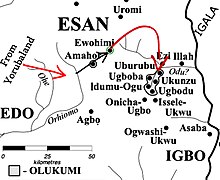Olukumi people
This article needs additional citations for verification. (March 2024) |
 Migration pattern of the Olukumi | |
| Total population | |
|---|---|
| Unknown | |
| Regions with significant populations | |
| Nigeria | |
| Languages | |
| Olukumi, Igbo | |
| Religion | |
| Christianity, Traditionalist | |
| Related ethnic groups | |
| Esan, Yoruba |
The Olukumi are a bilingual Anioma group of the Aniocha North area of the Delta State, Nigeria. They originate from Yoruba people and settled in this area long ago. The Olukumi occupy eight communities west of the Niger River, and are together known today as the Odiani Clan in Aniomaland.[citation needed] Ukwu Nzu town is the historical headquarters of the Olukumi people and is traditionally headed by the Obi of Ukwu Nzu, Agbogidi.[citation needed] The present Obi[when?] is H.R.M. Obi Ogoh 1.[citation needed] Olukumi villages select leaders through the Okpala Obi system, which is the Okpala (gerontocracy).[citation needed]
Geography[edit]
The Olukumi are native to an area just west of the Niger River's right bank. The area is rich in chalk and kaolin deposits, which is known as "nzu" in Igbo and "efun" in Yoruba, and has been traditionally mined and used by the people of the area for various cultural purposes.[weasel words][citation needed]
Etymology[edit]

The word Olukumi is said by some[according to whom?] to mean "My confidant" or "My friend" in Yoruboid.[citation needed]
History[edit]
According to Odiani oral tradition, the Olukwumi are a blend of aboriginal Igbo, migrants from the Owo, Akure, and Esan.[citation needed]
According to a report in the Sunday Tribune of October 24, 2010, they have also started to organize recitation and oratory quizzes and competitions in Olukumi to preserve the dialect.[citation needed] Linguists are also documenting the language. For 40 years, Chief G. B. Nkemnacho, a lawyer of Olukumi origin, has documented his people's history as told by its elders as life experiences and oral tradition.[1]
Olukumi towns and communities[edit]
| s/n | Town | Origins | Comment(s) |
|---|---|---|---|
| 1 | Ukwu Nzu | and Owo is said to be the political head of the Odiani clan of the Olukumi.[clarification needed] | |
| 2 | Ugbodu | Traditional centre of Olukwumi people.[contradictory] | |
| 3 | Ubulubu | People from Ugbodu and Ukwu Nzu | A relatively late Olukumi town said[by whom?] to have been founded by some Ugbodu people later joined by others from Ukwu Nzu.[citation needed] |
| 4 | Idumu Ogo | ||
| 5 | Ugboba (Ugbo Oba) | ||
| 6 | Ogodor | ||
| 7 | Ogbe Onei (Obomkpa) | ||
| 8 | Anioma village |
Non-Olukumi villages with Olukumi ancestry[edit]
| s/n | Town | Origins | Comment(s) |
|---|---|---|---|
| 9 | Onichaku (Ubulu Uku) | ||
| 10 | Ogbekenu quarters/villages of Onicha-Ugbo |
Language[edit]
Notable Olukumi people[edit]
- Nduka Ugbade - (Former Nigerian football star and coach)[citation needed]
- Helen Anyamelune - (1958 Miss Nigeria)[citation needed]
See also[edit]
References[edit]
- ^ Augustine Senan Ogunyeremuba Okwu (2010). Igbo Culture and the Christian Missions, 1857-1957: Conversion in Theory and Practice. Rowman & Littlefield. p. 13. ISBN 9780761848844.
